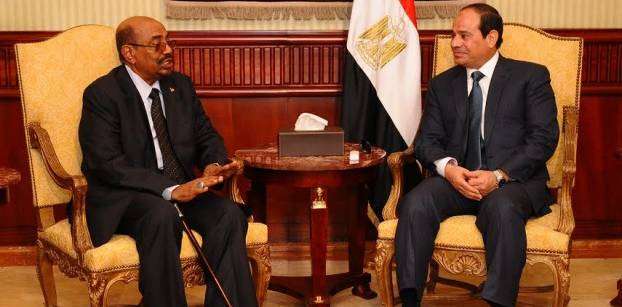Egypt, Sudan and Ethiopia sign on Renaissance dam impact studies

President Abdel Fattah al-Sisi meets with Sudanese President Omar al-Bashir on Oct.18,2014. ASWATMASRIYA
CAIRO, Sept 20 (Aswat Masriya) - The technical teams of Egypt, Sudan and Ethiopia signed the final the contracts for the Grand Ethiopian Renaissance Dam (GERD) technical studies on Tuesday in Khartoum.
The three states have agreed that the French consultancy firms BRL and Artelia will carry out the studies on the impact that the GERD will have on the flow of the Nile, while the British law firm Corbett will overlook the legal affairs of the process.
The water and irrigation ministers of the three countries also attended the signing ceremony. The groups signed five copies of contacts, 200 pages each, the state-owned MENA news agency said.
Egypt's Irrigation Minister, Mohamed Abdel-Aty, called the ceremony "historic," MENA reported.
In December 2015 tripartite talks, the three groups signed the “Khartoum Document,” which stipulated a mechanism for resolving GERD related issues, and set a time frame of eight months to a year to complete the technical studies. Sudan's foreign minister had previously said the studies would begin in February.
The trio are to split the costs of the studies equally among them, according to the Ethiopian foreign ministry.
Last month, Egyptian Minister of Water and Irrigation Hossam Moghazi said one study will determine the effects of the dam on the water reaching Egypt and Sudan, as well as on the effects on the electricity outputs of already existing dams. Both Egypt's Aswan High Dam and Sudan's Merowe Dam are hydroelectric projects.
The second study will identify the effects of the environmental, economic and social effects of the dam on Egypt and Sudan, Moghazi added.
For decades, Egypt has been receiving 55 billion cubic meters of the Nile river's water annually, the largest share, as per agreements signed in the past century in the absence of Ethiopia, whose Blue Nile tributary supplies most of the water.
Once an agricultural state, Egypt relies on the Nile river as its main source of water but Ethiopia believes it is entitled to using the water for development, by creating electricity using the dam. The two countries have reiterated multiple times that they will not harm each other's interests, which seem to conflict.









facebook comments